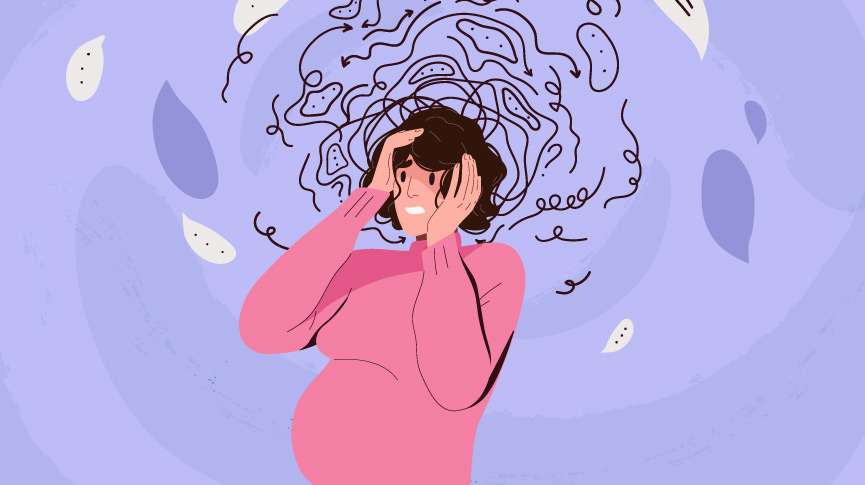Mothers: What is Maternal Anxiety?

The thing about anxiety is that it doesn’t discriminate. And because it is so diverse, it’s difficult to give it a definition. It can be entirely unique from person to person.
It also doesn’t help that there are a seemingly endless list of things that can bring about anxiety or anxious feelings in general.
This makes it a mental health issue that’s rife, and those who suffer from it deserve attention and understanding—including moms and moms-to-be.
You see, for many, the term “postpartum depression” sounds familiar. But feeling anxious instead of sad or depressed during pregnancy and after having a baby is actually quite common, yet hardly talked about.
What is maternal anxiety?
Sometimes maternal anxiety is merely considered to be a normal occurrence for pregnant women or new moms. It often includes a mental preoccupation with having a child.
But actually, it can be more serious than that—it could become a medical condition.
“Mental anxiety is anxiety that affects women during pregnancy, birth, and the first postnatal year,” says Dr. Catherine Green, psychologist. “It stops you from doing things, and sucks the joy out of things. That’s when it can become really distressing.”
Green goes on to say:
“There are lots of different forms of anxiety. The typical themes in maternal anxiety tend to be worrying that something bad is going to happen, either to you or your baby, during pregnancy, or postnatally, or perhaps during the birth, or that there’ll be some aspects of parenting that you won’t manage to cope with or tolerate.”
What are the main factors that bring about maternal anxiety?
A recent qualitative study was conducted by researchers Prikhidko and colleagues in which they spoke to 17 mothers for 30 to 60 minutes each.
They did this as a means to gather common concerns, and to look at underlying thought processes.
Once the interviews were complete, they were pooled and decoded, then organized into four overarching factors related to maternal anxiety.
4 factors related to maternal anxiety
As per the above-mentioned study, the four factors related to maternal anxiety include:
- Maternal insecurities and social comparison
- The balance between dependency and autonomy
- Cultural considerations
- Coping with anxiety
Maternal insecurities and social comparison
Some mothers revealed that they were dealing with self-doubt and that they were questioning their desire and motivation to be a good mother.
These mothers also felt as though there were social pressures to conform to ideals of motherhood, and had a fear of failure.
They often asked themselves questions such as: “Am I a good mother? and “Am I meeting my child’s needs?”
Also within this category, these mothers admitted that they often felt confused with all of the different advice available online. They also felt as though social media often made them feel inferior as a mother.
The balance between dependency and autonomy
This balance was not a fear based on themselves but rather, their child as they grow up.
For example, they feared the day their child would learn to drive, when they left for college, and other situations where they had more autonomy.
These mothers also experienced anxiety in situations in which they had no control. Things such as how others perceive their child, how their child gets treated, their child’s character and morals, their dating failures, and peer pressure.
They were worried that their child may make bad choices in life that may be permanent.
Cultural considerations
This factor looked at privilege versus social oppression. For example, racism was a huge source of anxiety for some of the mothers who, they themselves, had experienced discrimination.
This included things such as basic safety, and physical and mental health. They showed concern that their child may be ostracized or lonely because of how they were seen.
Then the theme of socioeconomic pressures was raised, and those who found themselves short on money often felt anxious for their child. They feared their child may not have equal opportunities and a good social standing.
Coping with anxiety
This theme was more so concerned about how these mothers dealt with anxiety pertaining to themselves.
They expressed that they may be able to reduce or cope with their anxiety by trying to remember that some things were out of their control.
Some also believed that their child may be negatively affected by their anxiety, so they wanted to try and reduce it.
Others revealed that they relied on their religion in times of anxiety and stress.
Then there was also the factor of generational trauma, which many moms did not want to pass onto their child.
Moving onto a different study, let’s take a look at how a mother’s anxiety could affect their child’s mental health.
Can mothers pass their anxiety onto their children?
In this 2008 study, 933 mother-child pairs were examined. The results showed that children of mothers who have an anxiety disorder were more likely to have one themselves.
The statistics showed that 24.7% of the mothers had an anxiety disorder and 33% of the children did too. The most prevalent type of anxiety passed down from mother to child was generalized anxiety or social phobia.
And then, a separate study conducted in 2018 showed that mothers-to-be who suffered from anxiety ran the risk of passing it onto their fetuses which could change the neural connectivity in the womb. In other words. It could literally change the brain networks in the fetus.
Additionally, this study found that stress, anxiety, or depression in pregnant mothers was associated with social, emotional, and behavioral problems in their children.
A possible solution? More mental health awareness!
As Dr. Catherine Limperopoulos, phD, says:
“Mental health problems remain taboo, especially in the peripartum period where the expectation is that this is a wonderful time in a woman’s life. Many pregnant mothers aren’t getting the support they need.
She continued to say:
“Changes at the systems level will be necessary to chip away at this critical public health problem and make sure that both mothers and babies thrive in the short and long term.”
So moms and mothers-to-be, we hope you are supported throughout your journey to motherhood. Anxiety is not bad nor taboo, and seeking help will be beneficial for both you and your child. You’re both worth it.

Helena is a sex-positive South African writer who loves swimming in the ocean under the full moon and cheesy 90’s pop. She’s currently living her best life in Porto, Portugal after scouring different continents to find her happy place.


